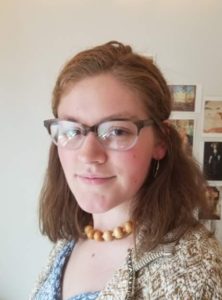Southwest Virginia LGBTQ+ History Project
Beth Janes

My work study position for this past academic year was working with Dr. Rosenthal as a Work Study Research Assistant. Through the semester I worked in collections management in an archive, I presented historical information to the general public, developed projects in the digital humanities, and attended community events. The specific projects I worked on over both semesters were digitizing issues of the Blue Ridge Lambda Press, a regional gay newspaper from the 1980s, up through its run in 1985; researching the impact of the AIDS crisis on the LGBTQ population of Roanoke; and editing oral histories to be used in a digital exhibit on the 1980s in Roanoke.
The process of digitizing the Blue Ridge Lambda Press took place at the Virginia Room, which is located at the main branch of the Roanoke Public Library in Downtown Roanoke. Dr. Rosenthal and I would go once a week for three hours when I would scan archived issues onto a flash drive to be processed and uploaded onto Shared Shelf, a digital archival platform. When necessary, I would also use this time to read through primary documents to find information for ongoing projects. This process is an ongoing task for the research assistant on the Southwest Virginia LGBTQ+ History Project.
The projects that were specific to me and my time as research assistant were working with oral histories and researching the history of AIDS in the Roanoke Valley. In working with the oral histories, my job was to edit untouched recordings from the oral history of an anonymous sex worker to protect the privacy of related parties as well as identifying and editing shorter excerpts for use in digital exhibits. My biggest project of the year was the creation of two informational pamphlets on the history of AIDS in Roanoke to be distributed to the public. The first pamphlet was a general overview of AIDS organizations in Roanoke, with a brief history of the disease’s presence in the Valley. The second pamphlet was more research intensive and was specific to the years 1983-1989. I created a timeline that followed the progression of individual AIDS cases, activism, and major news stories of the decade. This pamphlet was published and distributed at Roanoke’s Pride in the Park Festival in April.
I enjoyed the work I did this semester and feel as though the work strengthened my skills as a public historian and equipped me with more practical and technical skills that are necessary but seldom publicized. Compiling and managing a digital archive was definitely a learning curve for me. I had only ever had experience with physically-filed collections (which the History Project has) and the amount of work that goes into scanning, formatting, and properly uploading and labeling was much more than I would have originally guessed. It was tedious at times, but increasing direct accessibility to history through archive and museum collections is an integral part of my personal philosophy and is also part of the mission of the Southwest Virginia LGBTQ+ History Project. Additionally, I became familiar with Shared Shelf, which is a fairly common digital archiving service. I am sure these skills will be useful in later academic and professional endeavors. The work I did with the oral histories was by far my favorite aspect of my tenure as a research assistant. Besides getting to listen to the stories of LGBTQ individuals from Southwest Virginia, I learned skills I had never imagined needing in the field of history. I learned how to use audio editing software to edit oral histories for clarity and privacy; I learned how to extract clips for use elsewhere; and I learned to adjust technical aspects of the recording such as speed and volume. My first oral history experience was with an oral history from a former sex worker in Roanoke. Their recording required quite a few redactions of names, places, and events per Roanoke College’s Institutional Review Board (IRB). I had never interacted with the IRB before, and had only thought about it in the context of the social sciences.
This position as a research assistant has given me a much broader scope for looking at the way history, and specifically public history, is done. Going in, I knew very generally what each component of the position was (scanning, oral histories, education) but had never done any of them myself start to finish. Coming out of this year I feel as though I can speak with more authority on what within the field of history I like to do, why those individual aspects are important to the field as a whole, and what labor goes into each aspect.